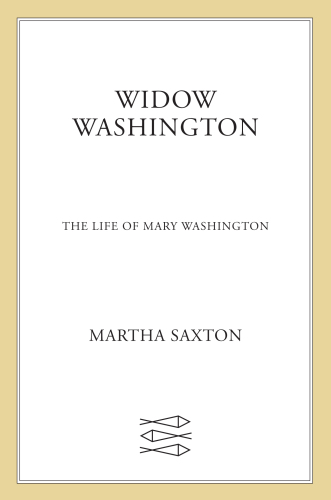
The Widow Washington
The Life of Mary Washington
کتاب های مرتبط
- اطلاعات
- نقد و بررسی
- دیدگاه کاربران
نقد و بررسی

April 15, 2019
A sympathetic look at George Washington's mother. Saxton (Emerita, History and Women's Studies/Amherst Coll.; Being Good: Women's Moral Values in Early America, 2002, etc.) believes that Washington's biographers have treated Mary Ball Washington (1708-1789) unfairly. "The caricature of an incompetent, crude, imperious, selfish, and unloving woman flowered fully in the 1940s and '50s," Saxton writes, a portrait based on scant evidence and shaped by sentimental maternal stereotypes. Steeped in Colonial history, the author takes on a formidable project: to uncover the shards of Mary's life, place her in the context of her times, and tease apart "the biographical fates of mother and son" in order to give Mary "the dignity of her independent existence." Saxton offers a sensitive, sharply drawn portrait of a resourceful woman whose early losses made her anxious and fearful for life. By the time she was an adolescent, her father, stepfather, half brother, and mother all had died. After 11 years of marriage, she became a widowed mother of five, facing financial instability. "Trauma," Saxton observes, "was Mary's normality." As an old woman, one evening, during a thunderstorm, her daughter found her praying alone: "my trust is in God," Mary confessed, "but sometimes my fears are stronger than my faith." Her fears led her to be overprotective of her children, not least her eldest son, George. When he was 14, Mary strongly opposed his desire to join the British navy as a midshipman--"a singularly dangerous institution," Saxton notes. Mary prevailed but later found herself repeatedly at odds with her son's "aggressive, restless, and risk-taking spirit" as well as his vanity and stinginess. Besides closely examining Mary's relationships with various members of her extended family, Saxton mostly succeeds in the challenge of treating fairly Mary's role as a demanding, often cruel, slaveholder who tried to project strength and authority through "force, name-calling, and abuse." Her religious beliefs validated that treatment: "violence," Mary thought, "could justifiably produce obedience," and obedience led to moral behavior. Like others of her time and class, slavery shaped her identity. A fresh perspective on Colonial America.
COPYRIGHT(2019) Kirkus Reviews, ALL RIGHTS RESERVED.

May 6, 2019
Saxton (Being Good: Women’s Moral Values in Early America), a professor of history at Amherst, serves up an accessible and vivid exploration of the life of George Washington’s mother. Her perspective is sympathetic without ignoring Washington’s moral failings; she makes clear from the outset that Washington was a slaveholder who did not have an enlightened attitude towards the people she considered her property. Born in Virginia in either 1708 or 1709, by adolescence Washington had already lost both parents, a stepfather, and a half-brother; after she was widowed in 1743, she struggled to care for five children. Saxton documents Washington’s hard work ethic and devotion to her children, even when she disagreed with them (as when she thwarted 14-year-old George’s desire to join the British Navy). And she brings to life the social context of the time, in which, under Virginia law, women were plunged underwater if their husbands did not pay fines for their supposed slander and slavery was rampant (“Orphaned by the deaths and sales of parents, slave children lived in a culture in which... grief was everywhere and comfort rare.”). Although the absence of much primary source material forces Saxton to qualify many statements, she comes as close as anyone is likely to in accurately recounting Washington’s life. This complex, warts-and-all portrait brings a fresh angle to colonial American history.

Starred review from June 1, 2019
Saxon (history & sexuality, women's & gender studies, Amherst Coll.; Being Good) aims to restore the reputation of Mary Ball Washington (1709-89), clouded by previous historians' portrayals of her as unkind and selfish, based largely on stereotypes and misinterpreted excerpts from the letters of eldest son George Washington. By recounting the known details of Mary's life from the few remaining family letters and legal documents, Saxon skillfully fills in the gaps, relating Mary's story in the context of legal, economic, and social realities of 18th-century Virginia planter society. Personal hardships, along with quotes from Mary's prized spiritual guidebooks, explain her pious and determined character, along with her attitudes toward life, death, slave-holding, child-rearing, and the military--all of which she imparted to her children and grandchildren. Saxon describes George and Mary's complex, mutually respectful, loving relationship, and their shared stoicism and miserliness. Although a dutiful son, George's resentful complaints about his mother's demeanor and requests for assistance, Saxon explains, came mostly from a defensiveness regarding his status and embarrassment of his unpolished past. VERDICT All readers will value this vivid account that corrects Mary's record and reveals the dilemmas and distorted sensibility of Virginian slave-holding white women, along with the devastation caused by the Revolutionary War.--Margaret Kappanadze, Elmira Coll. Lib., NY
Copyright 2019 Library Journal, LLC Used with permission.

























دیدگاه کاربران